Everything you need to know about China’s space race
It has landed craft on Mars and on the dark side of the Moon, and it is building a space station. What are China’s ambitions in space?
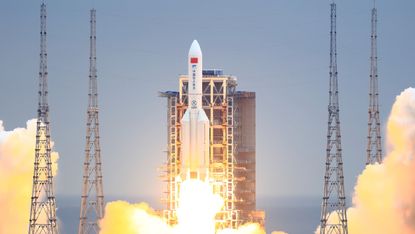
Space exploration has been a long-term goal for the People’s Republic ever since the Soviet Union launched Sputnik 1 in 1957. Chairman Mao lamented at the time that “we cannot even put a potato into space”, and the Communist Party leadership vowed to produce “two bombs and a satellite”: an atomic bomb, a hydrogen bomb, and a satellite.
China did not launch its first satellite until 1970, but since the 1980s it has been catching up fast with the major spacefaring nations. Its space programme really announced itself to the world in 2003, when Yang Liwei became its first taikonaut (as China calls its astronauts), orbiting the Earth 14 times during a 21-hour flight aboard the Shenzhou 5 spacecraft. China thus became the third nation to independently send astronauts into space.
What are its ambitions now?
Subscribe to The Week
Escape your echo chamber. Get the facts behind the news, plus analysis from multiple perspectives.

Sign up for The Week's Free Newsletters
From our morning news briefing to a weekly Good News Newsletter, get the best of The Week delivered directly to your inbox.
From our morning news briefing to a weekly Good News Newsletter, get the best of The Week delivered directly to your inbox.
Under President Xi Jinping, plans for China’s “space dream”, as he calls it, have gone into overdrive. It aims not only to pass the milestones achieved by other nations, notably the US, but to overtake them as the leading space power by 2045.
The China National Space Administration had an annual budget of about $8.9bn last year, second only to Nasa’s (of around $23bn). It has landed rovers on the Moon and, more recently, on Mars. Last year, it completed the BeiDou satellite constellation, a rival to the US Global Positioning System. This year, it launched the first part of a permanent space station into orbit (debris from a Long March-5b launch rocket fell back into Earth’s atmosphere on an “undirected dive”, crashing into the Indian Ocean).
What has China achieved on the Moon?
The first mission in China’s lunar exploration programme, Chang’e 1, reached the Moon’s orbit in 2007. Six years later, it landed a robotic rover on the lunar surface, which operated for 31 months. Other nations had achieved such feats before, but China has pioneered too: in 2019, Chang’e 4 became the first spacecraft to land on the far side of the Moon – which faces away from the Earth, making it difficult to communicate with space-craft there.
At the end of 2020, the fifth Chang’e mission scooped up a few kilograms of rock and brought them back to Earth – the first lunar sample-return mission since the final Soviet Moon mission in 1976. Three more lunar missions are planned by 2027, to prepare the ground for a future Chinese base (potentially built in collaboration with the Russian space agency, Roscosmos) that would be permanently inhabited by taikonauts.
What about the space station?
In late April, China launched Tianhe, the first module of what will become a new space station, Tiangong (“Heavenly Palace”). Two further modules will be added to Tianhe next year, which will provide laboratory space for research on everything from the long-term impacts of living in microgravity to studying how fluids and materials behave beyond Earth.
Alongside its space station, China also wants to launch a space telescope, similar in size to Nasa’s Hubble telescope. When complete, Tiangong will be able to accommodate three taikonauts for long-term missions or six for shorter trips. Astronauts from other countries would also be allowed to visit the space station; Tiangong will become operational by 2023, just as the International Space Station comes to the end of its operational life.
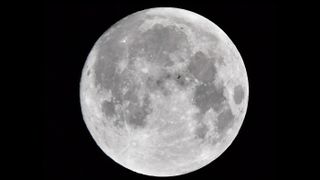
What drives China’s programme?
China is determined to be the world’s science and technology superpower. A space programme is a tried-and-tested way for a nation to enhance its industrial and economic strength, and also project prestige and technical competence to its own citizens – and to the rest of the world. China sees its space capability as important for economic and diplomatic leverage: it is trying, for instance, to persuade countries to dump the US’s GPS satellite navigation in favour of its BeiDou system.
From China’s perspective, it has little choice but to build its own ambitious space programme: concerns about technology theft mean its scientists have been banned by the US Congress since 2011 from working with Nasa, and shut out from projects such as the International Space Station. And in today’s networked world, space technology is critical not just to the financial system, for example, but to national security.
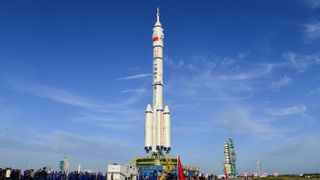
Does China want to militarise space?
“Space is already an arena of great power competition,” Lloyd J. Austin III, the new US secretary of defence, declared recently. Satellite networks are used to keep military information systems running; both the US and China have the capacity to knock out enemy satellites in the event of a conflict. The situation is made more complex because most space technologies are “dual-use”: they can be used to perform civilian or military tasks.
Understanding China’s aims is made difficult by the country’s opaque policy-making apparatus, and by President Xi’s “military-civil fusion development strategy”, which purposely blurs the lines between military and civilian technology development on everything from semiconductors and 5G to aerospace and AI.
What else is China planning?
China wants to send a second lander to Mars by 2028 and, eventually, to bring samples back from the red planet. That next phase of Mars exploration could become a genuine race with Nasa and the European Space Agency, which are working together on an ambitious sample-return mission of their own. Future missions could also include a sample-return mission from an asteroid, a fly-by of a comet, and orbiting observatories for Venus and Jupiter.
China is continuing to develop new spacecraft too. There are rumours that it is working on a reusable space plane. And China’s space administration reportedly wants to beat Nasa in the race to take astronauts to Mars.
Landing on the red planet
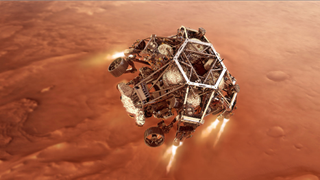
In a matter of months, China’s Mars mission, Tianwen (meaning “Heavenly Questions”), has completed a stunning trio of achievements: it entered orbit in February, landed on the surface of the red planet (at Utopia Planitia) on 14 May and, a few days later, sent its Zhurong rover (named after a Chinese god of fire) trundling onto the rocky ground.
Getting to Mars is hard, but landing is much harder: Nasa calls the descent through its super-thin atmosphere the “seven minutes of terror”. The Soviet Union landed a craft on Mars in 1971, but it stopped communicating shortly after it reached the surface. Only the US had previously managed successful Mars landings – the most recent being the Perseverance rover in February.
Zhurong weighs in at around 240kg, a quarter of the mass of Nasa’s Perseverance, but similar to the Spirit and Opportunity rovers that landed on Mars in 2004. Like those older Nasa rovers, Zhurong is powered by solar panels (Perseverance uses nuclear-powered batteries). Its instruments, including cameras, ground-penetrating radar and a magnetic field detector, will study the planet’s surface, topography, atmosphere and geology, and in particular the distribution of ice – which could be a useful resource for human visitors.
Create an account with the same email registered to your subscription to unlock access.
Sign up for Today's Best Articles in your inbox
A free daily email with the biggest news stories of the day – and the best features from TheWeek.com
-
 Nigeria's worsening rate of maternal mortality
Nigeria's worsening rate of maternal mortalityUnder the radar Economic crisis is making hospitals unaffordable, with women increasingly not receiving the care they need
By Harriet Marsden, The Week UK Published
-
 'Elevating Earth Day into a national holiday is not radical — it's practical'
'Elevating Earth Day into a national holiday is not radical — it's practical'Instant Opinion Opinion, comment and editorials of the day
By Harold Maass, The Week US Published
-
 UAW scores historic win in South at VW plant
UAW scores historic win in South at VW plantSpeed Read Volkswagen workers in Tennessee have voted to join the United Auto Workers union
By Peter Weber, The Week US Published
-
 The hunt for Planet Nine
The hunt for Planet NineUnder The Radar Researchers seeking the elusive Earth-like planet beyond Neptune are narrowing down their search
By Chas Newkey-Burden, The Week UK Published
-
 Winchcombe meteorite: space rock may reveal how water came to Earth
Winchcombe meteorite: space rock may reveal how water came to EarthThe Explainer New analysis of its violent journey confirms scientific theories on the origin of our planet's H2O
By Sorcha Bradley, The Week UK Published
-
 Why the Moon is getting a new time zone
Why the Moon is getting a new time zoneThe Explainer The creation of 'coordinated lunar time' is part of Nasa's mission to establish a long-term presence on Earth's only natural satellite
By Richard Windsor, The Week UK Published
-
 We're in the golden age of space exploration
We're in the golden age of space explorationIn depth To infinity and beyond!
By Devika Rao, The Week US Published
-
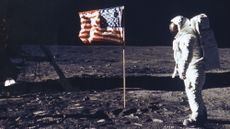 All the major moon landings so far
All the major moon landings so farThe Explainer One giant leap for mankind
By Devika Rao, The Week US Published
-
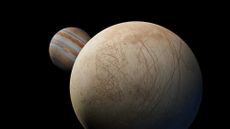 Jupiter's Europa has less oxygen than hoped
Jupiter's Europa has less oxygen than hopedspeed read Scientists say this makes it less likely that Jupiter's moon harbors life
By Peter Weber, The Week US Published
-
 'Magnolias in space': why scientists have created the world's first wooden satellite
'Magnolias in space': why scientists have created the world's first wooden satelliteUnder The Radar New Japanese probe could help tackle 'graveyard of space junk' encircling Earth
By Chas Newkey-Burden, The Week UK Published
-
 The moon, it's shrinking!
The moon, it's shrinking!The Explainer Landing on the moon is soon going to be harder than previously thought
By Devika Rao, The Week US Published